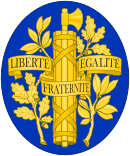
Prime Minister of France
Head of Government of France / From Wikipedia, the free encyclopedia
Dear Wikiwand AI, let's keep it short by simply answering these key questions:
Can you list the top facts and stats about Prime Minister of France?
Summarize this article for a 10 years old
The prime minister of France (French: Premier ministre français), officially the prime minister of the French Republic, is the head of government of the French Republic and the leader of the Council of Ministers.
| Prime Minister of the French Republic | |
|---|---|
| Premier ministre de la République française | |
 | |
 | |
| Council of Ministers of the French Republic Government of France | |
| Style | Madam Prime Minister (informal) Her Excellency (diplomatic) |
| Status | Head of government |
| Member of | |
| Reports to | President |
| Residence | Hôtel Matignon |
| Seat | Paris, France |
| Appointer | President |
| Term length | No term limit |
| Constituting instrument | Constitution of France |
| Precursor | Several titles were used since the Ancien Régime |
| Inaugural holder | Charles Maurice de Talleyrand-Périgord |
| Formation | 9 July 1815; 208 years ago (1815-07-09) |
| Salary | €178,920 annually[1] |
| Website | www |
 |
|---|
|
|
|
Related topics |
The prime minister is the holder of the second-highest office in France, after the president of France. The president, who appoints but cannot dismiss the prime minister, can ask for their resignation. The Government of France, including the prime minister, can be dismissed by the National Assembly. Upon appointment, the prime minister proposes a list of ministers to the president. Decrees and decisions signed by the prime minister, like almost all executive decisions, are subject to the oversight of the administrative court system. Some decrees are taken after advice from the Council of State (French: Conseil d'État), over which the prime minister is entitled to preside. Ministers defend the programmes of their ministries to the prime minister, who makes budgetary choices. The extent to which those decisions lie with the prime minister or president often depends upon whether they are of the same political party. If so, the president may serve as both the head of state and de facto head of government, while the prime minister serves as his deputy.
Jean Castex resigned as prime minister on 16 May 2022, and President Emmanuel Macron appointed Élisabeth Borne, Minister of Labour, Employment and Integration, as his successor the same day. Her government, the first led by a woman since Édith Cresson in 1992, was announced four days later on 20 May.
.jpg/200px-La_Première_ministre_française_Élisabeth_Borne_(cropped).jpg)